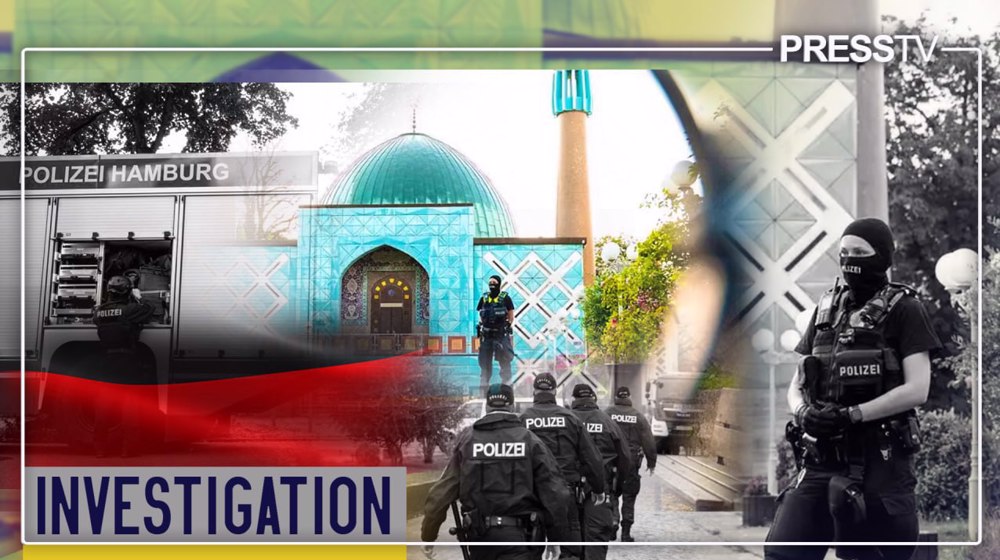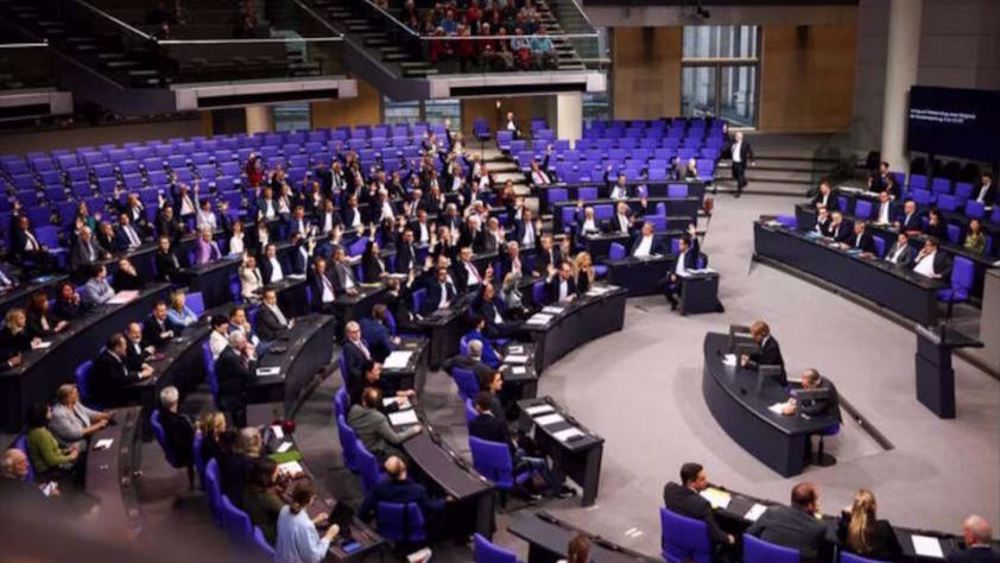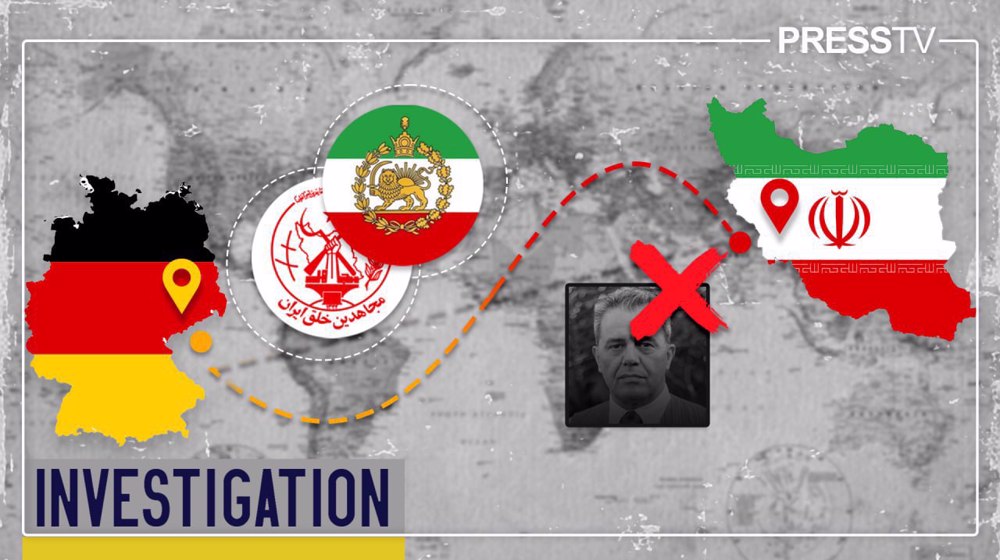Unpacking real story behind closure of Islamic Center Hamburg by German govt.
By Ivan Kesic
Succumbing to the pressure of the powerful Zionist lobby, Germany has banned the oldest and leading Shia Muslim center and affiliated organizations in its latest Islamophobic move.
On Wednesday morning, German police conducted an unannounced and unwarranted raid on 53 properties across the country linked to the Islamic Center Hamburg (IZH).
The IZH operates from the Imam Ali Mosque, a popular religious center located in the central upmarket area on the shores of the northern German city's Outer Alster Lake.
The police raid was followed by German Interior Minister Nancy Faeser’s statement that the IZH and its affiliated organizations would be banned for "pursuing radical Islamist and anti-constitutional objectives," without elaborating what she meant.
Faeser linked the center to the Lebanese resistance movement Hezbollah, which Berlin has designated as a "terrorist" organization, as well as promoting "aggressive anti-Semitism" and spreading "totalitarian theocratic rule."
According to experts, the move is reminiscent of how British authorities shut down the Islamic Center of England (ICE), a leading Shia mosque and charitable organization in London, last year.
What is the Islamic Center Hamburg?
The Islamic Center Hamburg, also known as the Imam Ali Mosque or the Blue Mosque, is a major organization of Shiite Islam in Germany, founded in 1953 and opened in 1965 on the initiative of Ayatollah Hossein Borujerdi and Iranian workers in that country.
Construction and decoration work continued for many years, with financing from Iranian workers in Hamburg, Iranian religious organizations, and private donations from Germany and Iran.
The mosque was designed in a typical Iranian architectural style, with a turquoise dome, two minarets and an iwan (portal), the prayer hall was decorated with mosaic tiles by Mashhad artists, and the mihrab was donated by the iconic Goharshad Mosque.
As the office and study rooms proved inadequate in size, a project was launched to expand the original mosque, which includes a separate domed library, office space and an underground parking garage.
The ensemble of the Imam Ali Mosque with a garden and a fountain has been included in the list of national heritage by the Hamburg Authority for Culture and Media.
The candidate for head of the IZH required the highest Shia jurisprudential credentials, an outstanding reputation in the community, strong oratory skills, and a charismatic personality.
The leaders of IZH have included prominent Iranian clergy members, including Mohammad Mohaqeqi, Mohammad Beheshti, Mohammad Khatami, Mohammad Reza Moqaddam, Abbas Hosseini Qaemmaqami and Reza Ramezani Gilani.
The last among them, Mohammad Hadi Mofatteh, was also the director of religious programs at the Islamic Republic of Iran Broadcasting (IRIB) for years.
IZH’s activities included providing religious counseling services, publishing magazines in German and Persian, organizing interfaith events with Western lecturers and managing a library with over 6,000 titles on various Islamic topics.
The center also organized International Quds Day, an annual event that brings together millions of people around the world who march in solidarity with the Palestinian struggle for freedom.
Germany bans Islamic Centre Hamburg, affiliateshttps://t.co/SO0xs0xAP6
— Press TV 🔻 (@PressTV) July 24, 2024
Longstanding anti-IZH activities
During its 70 years of existence, the Islamic Center Hamburg has been subjected to numerous pressure campaigns, witch-hunts, attacks and vandalism, as well as individual, group and government harassment.
In the years leading up to the Islamic Revolution in 1979, the Pahlavi regime had blocked the center's bank accounts because it was where student activism against the dictatorship began to flourish.
In the early 1990s, the IZH became a target of the Zionist hate campaign because of its cultural ties to the Islamic Republic of Iran, with calls for its closure and toxic Islamophobic slandering.
For example, Yossef Bodansky, an Israeli-American author, Zionist cheerleader and staunch Islamophobe who worked for the US Congress for years, called the IZH and numerous other Islamic cultural centers "nests of terrorism" in his pamphlets.
The loudest calls for its closure came from the Central Council of Jews in Germany, the country's umbrella Jewish organization, the Israeli embassy in Berlin, and the Zionist lobby with its affiliated groups.
Political parties such as Alternative for Germany (AfD), Social Democratic Party (SPD), Christian Democratic Union (CDU), Free Democratic Party (FDP) and Greens have been demanding the City of Hamburg to terminate the cooperation agreement with the IZH.
Among the most active lobbyists for closure for years was also Mujahedin-e-Khalq Organization (MKO), the West-based anti-Iran terror cult, using unproven conspiracy theories that IZH was a "spy center."
The IZH was the target of several attacks: in July 2021, it was spray-painted, and in September 2022, the mosque was again damaged and an employee was injured.
In August 2022, in the month of Muharram, Islamophobes desecrated the Holy Quran in front of the Imam Ali Mosque, and German police officers stood there as mute spectators.
In response, the Iranian country's Foreign Ministry summoned Germany's chargé d'affaires and condemned the provocative move, describing it as a clear example of hate-mongering, violence, and extremism.
Germany's shutdown of Islamic center violates 'fundamental human rights': NGOhttps://t.co/IlMeYSnKc5
— Press TV 🔻 (@PressTV) July 26, 2024
German pressure campaigns
In 1993, congruent with the beginning of the Zionist slandering of Islamic organizations in Europe, Hamburg's Office for the Protection of the Constitution put the IZH on a watch list, citing connections with the Islamic Republic of Iran.
The IZH repeatedly protested against its monitoring, stating that it was a purely religious institution that only dealt with the religious affairs of Shia Muslims living in Europe.
Intense discussions about shutting down the Islamic Center Hamburg in the German government emerged in late 2022, apparently out of frustration at the failed Western-backed riots in Iran.
According to Iranian intelligence services, Germany served as a center of European efforts to fan the flames of those protests, and the German embassy in Tehran served as a coordinating center for the other Western embassies involved in those efforts.
At that time, under obvious political pressures, the Hamburg court ruled that it was legal to label the IZH "extremist," despite the report being based on baseless assessments.
The German Interior Ministry then announced that it was launching an investigation into the organization's alleged "unconstitutional" actions, such as accusations that it cooperates with Hezbollah, which is banned in Germany from 2020.
In November 2023, in response to increasing pro-Palestinian protests in Germany over Israel's genocidal war on Gaza, German police raided dozens of Islamic organizations in line with their pro-Zionist policy.
One of the targets was the Imam Ali Mosque in Hamburg, where the police suddenly broke in, searched the property, and confiscated computers and mobile phones.
No incriminating evidence was found, and no one was convicted, testifying that the goal of the multistate operation was mere harassment and intimidation of pro-Palestinian Muslims.
In the latest hostile move against the IZH, the center was completely shut down, property was confiscated, and affiliated organizations across Germany were also banned.
These include the Islamic Academy of Germany (IAD), the Association of Supporters of Iranian-Islamic Mosque in Hamburg, the Center of Islamic Culture Frankfurt (ZIK), the Islamic Association of Bavaria in Munich (IVB) and the Islamic Center Berlin (IZB).
The informed source described the operation as a "heavy-handed onslaught" and a "violent attack," reporting that German police entered mosque grounds with dogs, ignoring religious considerations, and had been conducting inspections for several hours.
Furthermore, the homes of officials, directors, imams, and staff of these centers have been surrounded by German police, making it impossible to contact them.
German officials and the media called the center "extremist and totalitarian," which constitutes indirect insults against Iran and confirmation of Germany's decades-long policy of hostility against the country.
Not surprisingly, the anti-Iranian move by the German government was openly praised by various Zionist organizations, including the Central Council of Jews in Germany, the European Jewish Congress (EJC) and the American Jewish Committee (AJC), as well as the MKO terror cult.
Germany's closure of Islamic center political move aims to serve Israel: Iran acting FMhttps://t.co/W6UHrg506B
— Press TV 🔻 (@PressTV) July 28, 2024
Strong condemnations
On the same day that the ban took effect, Iran’s Foreign Ministry summoned Germany's ambassador to Tehran Hans-Udo Muzel to lodge a protest, condemning it as a "hostile action contrary to the fundamental principles of human rights."
The ministry pointed to the valuable services of the Islamic Center Hamburg in explaining the teachings of Islam, promoting the principle of dialogue and religious tolerance, and combating extremism.
"Unfortunately, what happened in Germany is a clear example of Islamophobia and opposition to the teachings of Abrahamic religions, which of course, on the other side, amounts to dictatorship and deliberate promotion of violence," the ministry official said in a statement.
He noted that "Some currents supporting marked terrorists and advocates of violence and extremism, by making baseless accusations, are seeking to fuel religious and sectarian tensions.”
“The Muslims of Germany and other free thinkers of the world will wisely render this plan doomed."
The ministry warned the German government of the consequences of such moves, which is an example of opposing freedom of thought and expression and practically promoting violence and extremism.
Iran's interim Foreign Minister Ali Bagheri Kani also condemned the German move to ban the IZH and its subsidiary organizations, stating that the step violates fundamental principles of freedom of religion.
"The decision by German judicial and law enforcement authorities on inspection of premises affiliated to IZH, which is among the oldest Islamic centers [in the country] with a history of 70 years and a precious heritage of late top Shia authority Grand Ayatollah [Hossein] Boroujerdi, is an unjustified move and flouts all principles of freedom of religion and thought," Kani wrote on X, formerly Twitter.
"The terrorist regime of Israel, which uses every excuse to divert public opinion from the ongoing genocide against Palestinians, also welcomed the German police's move," he added.
Kani stated that the measure is a gift to extremists, violence mongers and advocates of terrorism, holding the German government responsible for the repercussions of the unjustified and vicious act.
On Saturday, during a phone conversation with German Foreign Minister Annalena Baerbock, he repeated that the shutdown of ICH in Germany was “a political and Islamophobic move that serves the interests of the Zionist regime, and the German government should accept the consequences."
Iran condemns Germany's ban on Islamic center as ‘freedom of religion violation’https://t.co/lgrFKEV68i
— Press TV 🔻 (@PressTV) July 26, 2024
Hypocrisy of HR claimants
On Sunday, the Qom Seminary's administrative office also issued a statement condemning the German move, noting that the closure of Islamic institutions “exposes the hypocrisy of those claiming to uphold freedom of religion and expression."
The statement added that the move “was reminiscent of the racist policies of the Nazi regime in Germany" and "in line with the Islamophobic tactics of the international Zionist movement."
It also called on Islamic countries to mount pressure on the German government to reverse the move as soon as possible, or to take reciprocal moves in response.
Iran has previously taken retaliatory measures against Germany's hostile activities, such as closing a German government-funded language institute in Tehran 20 ago after the installation of a plaque in Berlin in memory of anti-Iranian terrorists.
The Islamic Culture and Relations Organization (ICRO) in Iran also denounced the ban of the IZH, regarding it as the final episode of a scenario designed by the Zionist lobbies and urging the followers of all religions to hold the German government accountable.
Grand Ayatollah Hossein Noori Hamadani termed the act as "a violation of the rights of freedom-seeking people," and Head of the London-based Islamic Human Rights Commission Masoud Shajareh decried raids on the center's properties as "a symbol of the war against Islam."
He underlined that the current situation is a direct result of increasing Islamophobia and that the West aims to disconnect religion from politics, economics and society, which fundamentally contradicts the principles of original Islam.
Press TV’s website can also be accessed at the following alternate addresses:







 This makes it easy to access the Press TV website
This makes it easy to access the Press TV website